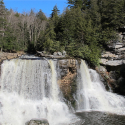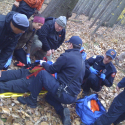As I sat on the beach last week during my vacation, I managed to relax and have fun. One of the many highlights of my days, then, was listening to the waves crash as I read with great interest my newest book. Of course, being a wilderness survival instructor, I tend to read non-fiction accounts of survival. After all, reading offers a great way to help learn from others about what it it takes to deal with adversity, often when you may most feel like giving up. This book was unique, however, in that it’s main focus is on the only official canine POW of World War II. No Better Friend: One Man, One Dog, and Their Extraordinary Story of Courage and Survival in WWII, written by Robert Weintraub, describes almost incredible accounts of heroism, fortitude, and devotion between dog and human alike. Born in Shanghai, China in 1936, Judy, an English Pointer, was […]
Read more →
As part of our everyday lives in our front-country worlds, blisters on our feet are not that big of a deal. That’s because you probably rarely get them, and, if you do, they are usually easy to remedy and protect. In fact, they are likely little more than an inconvenience. However, in a backcountry setting, you will definitely view blisters from a completely different perspective. To write that they are “painful,” as many of you would likely agree, is more than an understatement. Not only can they can easily ruin an otherwise wonderful day of hiking, but at worst, they can be truly debilitating. So, rather than risk letting the time, effort, and money that you spent preparing for your much anticipated hike go to waste, I thought that I would share with you two related articles from Wilderness Medicine magazine which is published by the Wilderness Medical Society. After all, I believe […]
Read more →Last Friday, CNN news anchor, Brooke Baldwin, again interviewed True North’s own Erik Kulick on her program Newsroom. This time, she wanted to ask about his thoughts concerning the rescue of Louis Jordan, the sailor who was rescued one day earlier, approximately 200 miles off the coast of Cape Hatteras, North Carolina, after apparently spending 66 days lost at sea in a sailboat. Given that this admittedly inexperienced sailor showed none of the expected hallmarks of a castaway, like severe sunburn, blisters, profound dehydration, and weight loss — not too mention that both of Jordan’s shoulders appeared remarkably normal considering that he stated to the U.S. Coast Guard that he had broken his shoulder early on in a storm — the media grew skeptical as the story developed. So Brooke spoke to Erik to ask his opinion about Jordan’s account. Just below, then, is a transcript of their talk. And if you like, you can watch […]
Read more →
In a wilderness emergency, especially one in which you suspect that you may not be rescued within 72 hours, potable water can be critical to your survival. This is because by that point – perhaps even sooner depending upon certain factors like the weather, your level of physical exertion, and medical condition – your bodily functions begin to become impeded and your mental status impaired. So, while you may have the necessary equipment to filter and purify water, you have to first find it. Can you? Just in case you are uncertain, let me share with you a few ideas and tips to consider. Where to Look Here are a few suggestions on finding sources of water: Keep in mind the basic truism that water doesn’t flow uphill or run along the top of ridgelines, so you’ll have much better luck looking in low spots, like valleys and drainages. There, not only […]
Read more →Speaking from experience, it’s seems that whenever one has to suddenly deal with an unexpected problem, rarely does it occur in perfect conditions. This, most especially, when it involves the outdoors. So, in this vein, my mind regularly ponders varying ways and means to effectively stay warm if one of my “day hikes” should ever turn into a overnight. Out of this, then, let me share with you a product that you may want to consider adding to you gear inventory. Now, of course, whenever I head out into the woods on some adventure, I am properly prepared to meet my seven priorities of survival — in particular, Priority #3 Shelter — but my concern is that even if I can protect myself from the wind and rain, it may still be hard to stay warm. Build a fire, right? Building a fire to dovetail with my shelter seems to be a […]
Read more →
As I regularly explain to our students in our wilderness survival and medicine courses, one doesn’t need to be an Army Ranger or a medical professional to benefit from these types of emergency training. After all, whether it’s a mountain top, a state park, a roadside accident, or a burning building, each of us may still at any moment be called upon to protect ourselves or the lives of others from some threat. Then, thereafter, we may need to live with the consequences of our action or inaction — Or, heck, perhaps we won’t live. At the moment of truth, it really doesn’t matter so much the size of your backpack, the fancy equipment in it, or your general professional training (I’ve heard of a group cardiologists who froze when a colleague collapsed of a cardiac arrest during a conference). Rather it is your head and heart that most matters. So […]
Read more →I just read a news article this morning about how a Canadian father and his 14-year-old daughter found themselves in a wilderness survival situation this past weekend after getting lost while skiing in British Columbia. I regularly read such accounts because I believe that they offer us good lessons about what to do in a such an emergency, but, just as importantly, what not to do. In this situation, what caught my interest was this pair’s focus on making a shelter instead of making a fire as many of us may have been inclined to do. On Saturday during our most recent Wilderness Survival 101 course, I stressed to my clients that the most important survival skill that they should hone, at least in my personal view, is making an emergency shelter. This is different from many other survival programs which stress making a fire. Now, don’t misunderstand me, I believe that fire […]
Read more →As a wilderness survival instructor, every so often I have the sense that a client believes that I’ve let him down when I fail to cover wild edibles as a food source. Such an expectation, though, is understandable since the general consensus certainly seems to be that a knowledge of wild edibles is vital to properly dealing with an emergency outdoors. After all, consider the millions of television viewers who tune in each week to watch a wide mix of survival reality shows as their hosts and contestants busily forage for plants, berries, and mushrooms during their scripted emergency. In turn, there are countless books, articles, and websites that vigorously promote the topic. But the actual reality is that I truly would be letting down my clients if I continued to foster this notion. That’s because in a survival situation, wild edibles should not be your primary food source. In fact, at the risk of further appearing […]
Read more →I know that it may be hard to believe, but activities that involve Winter camping offer some of the best opportunities of the year to enjoy the Great Outdoors. There tend to be far fewer people on the trail, and one can, quite literally, see, hear, feel, and smell a world completely different than the one that more commonly exists during the warmer months. But to be perfectly honest, I often need to remind myself of theses wonders in order to overcome my inherent resistance to sleeping overnight in the cold. After all, sleeping when one is cold to the point of suffering doesn’t help make for a fun, or, from a wilderness survival perspective, a safe trip. So here a few simple tips to consider: Keep your internal furnace burning all night. Before going to bed, eat (unless you have some kind of medical restriction) a high-calorie snack that […]
Read more →In any of the survival courses that I teach, very seldom do I make absolute statements to a client like “Definitely don’t do this,” or “Always do that.” After all, if a client finds herself in an emergency situation, it’s likely unique enough on some level that absolutes are not helpful, perhaps even detrimental. And when it comes to buying clothing and gear, every client has his own guidelines based on various criteria including their particular outdoor activity and interests, perceived needs and wants, and size of pocketbook. Instead, I generally try to offer recommendations, within a general range of possibilities and points to consider, supplemented with an explanation for context. Except in two cases. One of them being … Don’t wear cotton. By this I mean, never, or at least be extremely reluctant to, wear cotton clothing during your outdoors adventures. This “absolute” is given with the best of recommendations as there is a very […]
Read more →